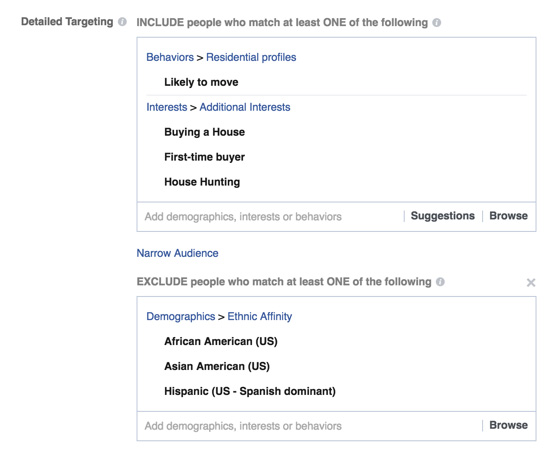It looks like Facebook has finally buckled under pressure, and will soon control the option for advertisers to target their audiences based on “ethnic affinity.” After concerns from U.S. regulators that such a functionality could be considered discriminatory, Facebook took a call and decided to announced the change on Friday.
Until now, advertisers have been able to include or exclude certain ethnic groups from key ad types such as housing, credit and employment.
The feature has been around for a while, and basically allows audience filtering by six main ethnic groups: African-American, Asian-American and four types of Hispanic groups based on whether they are bilingual or not.
On the surface, this would seem like a positive change, but several people have called it “absurd paranoia” and “ridiculous”. One commenter on a WSJ article covering the news item even called Facebook and the U.S. Lawmakers “Leftist Brownshirts.”
What is Ethnic Target Marketing?
Also known as diversity marketing, ethnic target marketing has been around since the 1950s in the United States. For example, certain products back then targeted WASPs, or While Anglo-Saxon Protestants. You can’t get more granular than that!
In the United States, the sheer diversity of the immigrant and indigenous population makes this a standard part of many ad campaigns. But unlike Facebook, most marketing platforms don’t really have it spelled out and segregated into specific ethnic groupings.
In fact, several well-known companies still do it today. For example, have a look at this video from big box retailer Target, which depicts an Asian-American mom and son as an “All American Family”:
Harley Davidson started marketing to women by offering riding classes. The McDonald’s tagline “I’m Lovin’ It” is based on market research on ethnic perspectives. Procter & Gamble has invested heavily in advertising to African-American families through their ads for Tide, Pantene and Oil of Olay. AT&T actually has a VP for Diverse Marketing to deal with targeting racial and ethnic groups.
That’s diversity marketing. Unless you can reach out to specific demographic and ethnic groups, you can’t sell a product effectively. And the big question is: why smother the vast diversity of the American people? Is there pressure on companies that target older age groups? Do U.S. lawmakers object to advertising to children?
On the one hand, it might be considered wrong to exclude ethnic groups in ad types such as employment and credit. But on the other, you need to take this on a case-to-case basis rather than apply a blanket rule.
Can Facebook simply modify their terms and conditions to warn advertisers not to misuse the ethnic affinity feature for their ads? Yes, they can, and they intend to. On top of that, however, they also intend to build tools that can “detect and automatically disable” such ad types.
I think they’re taking the right direction. They’re not planning to disable the functionality itself. That could severely impact their ad revenues from that segment of advertisers. What they’re doing is creating a smarter platform that can help identify and disable ads that should be open to everyone but are not.
As such, this is a sensitive subject considering the current scenario in the United States. The celebrated diversity of America has rarely been under pressure like it is now after Donald Trump won the elections. But are regulators using this instability to bully Facebook into complying with what it thinks is “correct”?
And what about the choice that Facebook users have in filling out their profile with their ethnicity? Will they be punished for defining themselves this way?
There seem to be too many ambiguous questions around this issue at the moment, but if Facebook does bend to the will of regulators, it will set a precedent for regulators to boldly attack other advertising platforms and perhaps even mainstream media.
Where do you think this is headed? Comments are welcome, but only if you’re an American citizen holding an American Express credit card with a limit no lower than $10,000 and a Siamese cat named “Pooch”!
Thanks for reading our work! Please bookmark 1redDrop.com to keep tabs on the hottest, most happening tech and business news from around the world. On Apple News, please favorite the 1redDrop channel to get us in your news feed.



